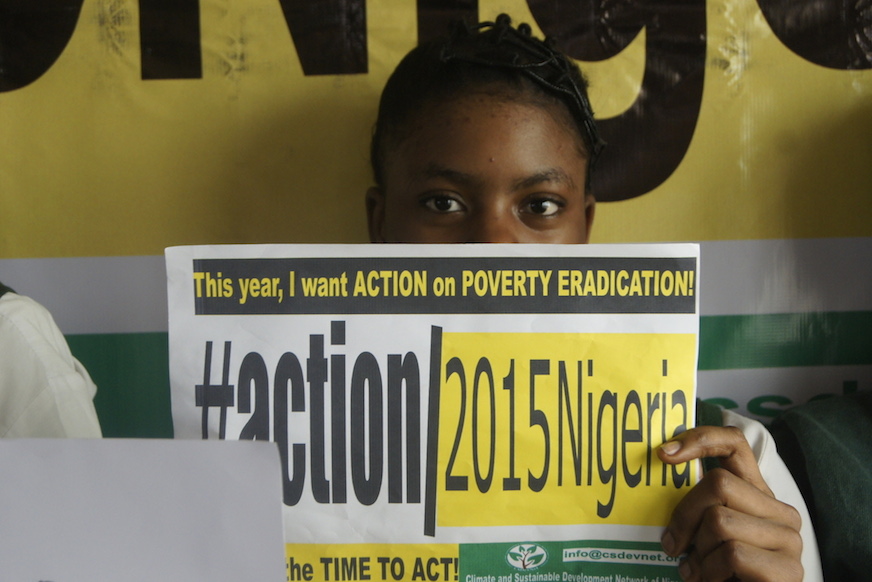
By Atâyi Babs
Globally, it is believed that the year 2015 is critically important as processes that will potentially shape development frameworks across the globe will be concluded this year.2015 is the year of two United Nations summits that can bend the course of history. One in September that will agree new goals – a new framework for humanity – to tackle poverty, inequality and environmental destruction. The other, in December to set new climate action targets, a crucial step towards a safer planet.
Also in March this year, the 3rd United Nations World Conference on Disaster Risk Reduction will develop a post-2015 framework for DRR just as many countries including Nigeria, are billed to hold general elections this year.
There is no gainsaying the obvious that the aforementioned processes are inter-related and dependent on each other as 2015 is the year our leaders will write their ‘to do lists’ for a generation and what comes out of those negotiations will reveal how ambitious they are – or aren’t – for the kind of world we can build together. World leaders must raise their ambition for humanity, but to make that happen, we must first raise our voice.
A swiftly penetrative gaze at our world today will reveal three things. Firstly, that our world is off track for ending poverty, tackling inequality and avoiding dangerous climate change. Secondly, it doesn’t have to be this way as we’ve already shown we can halve child deaths and protect the ozone layer to appreciable level in most parts of the world. We know how to fix problems – even really big ones – when we try. Third it will take pressure from all of us to get world leaders to make and keep the big commitments we need for a better world.
As Millennium Development Goals winds down this year, it must be reiterated that Sustainable Development Goals cannot be attained if the global community fails to heed the recommendations by science and act decisively on climate change. At the 2012 Rio+20 Conference, all countries agreed that climate change is a major obstacle to sustainable development and poverty eradication. This is supported by the experience of people living in poverty and vulnerability and major UN reports feeding into Post-2015.
Science further underlines the immediate need for action in all areas including international development. The urgency for action is underpinned by climate science and the window of opportunity for avoiding dangerous climate change is rapidly closing.
It is in the light of the above concerns that over 13,000 organisations in 130 countries came together under aegis of action2015 to form a movement of people who believe that 2015 can be a pivotal year to change the future of our people and our planet.
Expectedly, action2015 demands that 2015 commitments must reflect an end to extreme poverty by 2030 that condemns millions of people, especially women and girls, to an early death, poor education and ill health, a turning point in the soaring levels of inequality and discrimination driven by economic policies that deliver for the few rather than the many, and an accelerated transition to 100% renewable energy so that a safer climate and sustainable economy – with all its benefits for people and planet is made possible.
With a successful global launch of awareness campaigns and activities on the 15th of January 2015, action2015 believes that Post-2015 Framework must help to make climate action in all countries happen without further delay and must support poor people, particularly in Africa to build resilience so as to adapt to climate impacts they are experiencing already.
Suffice it to add also that the post-2015 framework should address all risks and hazards, both natural and human-made, including conflict and it must be part of, not separate from other development and environmental frameworks so that disasters, development, poverty and climate change are strategically integrated, particularly at the community level.
The coalition also demands that all 2015 commitments must be underpinned by the four guiding principles of inclusion, equity, people-centredness and environmental sustainability and should prioritise support to high-risk countries in Africa and populations disproportionately impacted by natural and human-made hazards and disasters. Closely linked to this is the need for the 2015 Agenda to prioritise high frequency, low-severity weather-related disasters, particularly in Africa and other areas of insecurity, insurgency and fragility.
With many African countries, cities, and states billed to hold elections this year and next, action2015’s call on the citizens of the world to pile up pressure on their leaders as well as aspiring leaders until climate change, poverty elimination and renewable energy transition become embedded not just in their manifestoes, but as fundamental human rights necessitating urgent attention of all, becomes very expedient and timely.
As action2015 continues to create avenues for people of the world to think globally while acting locally, providing ways for everyone everywhere to get involved by talking, taking action, texting and tweeting their way into influencing the outcomes of these global debates, the imperatives of taking action in 2015 must be highlighted. These debates affect us all. Our leaders must hear our voice. When political leaders meet and define their positions in these agreements, they will know that millions and millions of people will be demanding their human rights, listening to their promises and are ready to hold them accountable for what they do.
As the future beckons this year, it is hoped that we will all put on the front burner, climate action bordering on climate-smart agriculture, re-shoring the economy, sustainable land planning, alternatives to the car-culture, energy sobriety, eco-housing, ethical finance, social and environmental conversion of manufacturing, ethical consumption, a new share of wealth and work, community support, waste reduction and recycling, preservation of common goods such as water, soil, and forests.












